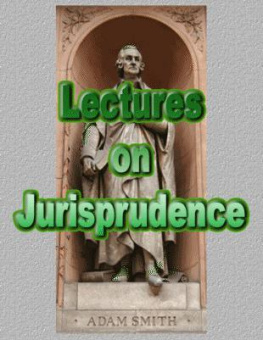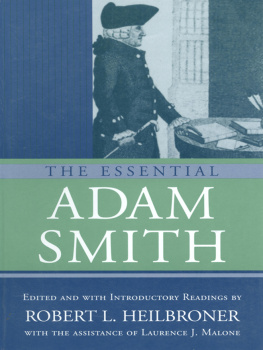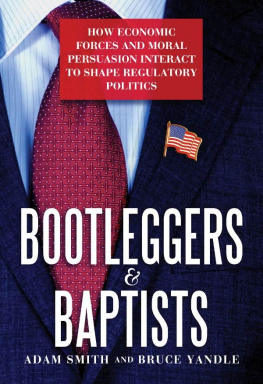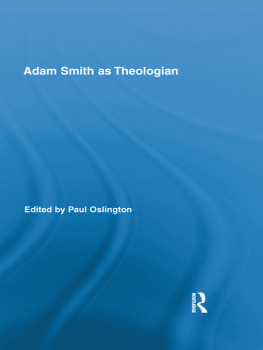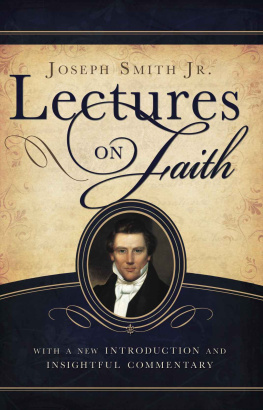Adam Smith - Lectures on jurisprudence
Here you can read online Adam Smith - Lectures on jurisprudence full text of the book (entire story) in english for free. Download pdf and epub, get meaning, cover and reviews about this ebook. year: 2008, publisher: Evergreen Review, Inc., genre: Science. Description of the work, (preface) as well as reviews are available. Best literature library LitArk.com created for fans of good reading and offers a wide selection of genres:
Romance novel
Science fiction
Adventure
Detective
Science
History
Home and family
Prose
Art
Politics
Computer
Non-fiction
Religion
Business
Children
Humor
Choose a favorite category and find really read worthwhile books. Enjoy immersion in the world of imagination, feel the emotions of the characters or learn something new for yourself, make an fascinating discovery.
- Book:Lectures on jurisprudence
- Author:
- Publisher:Evergreen Review, Inc.
- Genre:
- Year:2008
- Rating:3 / 5
- Favourites:Add to favourites
- Your mark:
- 60
- 1
- 2
- 3
- 4
- 5
Lectures on jurisprudence: summary, description and annotation
We offer to read an annotation, description, summary or preface (depends on what the author of the book "Lectures on jurisprudence" wrote himself). If you haven't found the necessary information about the book — write in the comments, we will try to find it.
Lectures on jurisprudence — read online for free the complete book (whole text) full work
Below is the text of the book, divided by pages. System saving the place of the last page read, allows you to conveniently read the book "Lectures on jurisprudence" online for free, without having to search again every time where you left off. Put a bookmark, and you can go to the page where you finished reading at any time.
Font size:
Interval:
Bookmark:
Of Jurisprudence . Adam Smit h
Jurisprudence is the theory of the rules by which civil governments ought to be directed.
It attempts to shew the foundation of the different systems of government in different countries and to shew how far they are founded in reason.
We will find that there are four things which will be the design of every government:
1 The first and chief design of every system of government is to maintain justice; to prevent the members of a society from incroaching on one anothers property, or siezing what is not their own. The design here is to give each one the secure and peacable possession of his own property. (The end proposed by justice is the maintaining men in what are called their perfect rights.) When this end, which we may call the internall peace, or 2 peace within doors, is | secured, the government will next be desirous of promoting the opulence of the state. This produces what we call police. Whatever regulations are made with respect to the trade, commerce, agriculture, manufactures of the country are considered as belonging to the police.
When Mr. resigned the office of of Paris to Mr. D'Argenson, he told him that the king required three things of him who held that office, that he should take care of 1, the cleaness or netete|/; 2, the aisance, ease or security; and 3 bon marche|/ or cheapness of provisions.--The 1 of these is two mean and trifling a subject to be treated of in a system of jurisprudence. The 2 is of two sorts, first that which provides for the security of the inhabitants against fires, or other such accidents. 3 I This also is of too trifling a nature to be reckoned a branch of jurisprudence. The other branch is that which provides against any injuries that may be done by other persons to the inhabitants; and this end is accomplished either by guards and patroles that prevent the commission of such crimes
as it were a Priori, or by the constitution of statutes for the punishment of transgressors and the encouragement of those who discover the offenders and bring them to justice.---The 2 part may be called the justice of police, and as it is connected in that manner with the former part of jurisprudence, we shall consider it under that head. The 3 part of police is bon marche|/ or the cheapness of provisions, and the having the market well supplied with 4 all sorts of com|modities. This must include not only the promoting a free communication betwixt the town and the country, the internall commerce as we may call it, but also on the plenty or opulence of the neighbouring country.
This is the most important branch of police and is what we shall consider when we come to treat of police; and in handling it we shall consider the different regulations that have subsisted in different countries and how far they have answered the intentions of the governments that constituted them; and this we shall to ancient as well as modern times.
3. As the government can not be supported without someexpence, though he state was very opulent, it would next be considered in what manner this 5 expence should be | born. In all cases it is evident that this burthen at last must lye on the industrious part of the people. Whether 1, it be born by the rents of what are called demesne lands, viz those that belong to the crown or the governing part of the nation. This as it abridges the possession of the subjects must be considered as a burthen on them. Or 2, it may be supplied by a tax on the lands possessed by the subjects. These though not rents of the crown are a deducement from the rents of the possessor. Or lastly, if it be raised by customs, on manufactures, imports and such like, where it is immediately levied from the people. In all cases therefore the expenses of the government must be defrayed by the people. The summ 6 | levied to defray these expenses is what we call the revenue of the government. In treating of that branch of jurisprudence which relates to government, we shall consider the different methods which have been taken to raise the sum necessary for the expense of the state in different countries, and how far they are adapted to do this with the least loss or hindrance to the industry of the people, which ought to be the chief thing in view. For it will also be shewn that the same summ may be raised in some ways which would mightily discourage the industry and improvement of the country and in others which would have those bad effects in a much less proportion.
4 Besides these 3 considerations of the security of property, the police, and the revenue of the kingdom or state, it must also be necessary to have some 7 means of | protecting the state from foreign injuries. Tho' the peace within doors be never so firmly established, yet if there be no security from injuries from without the property of individualls can not be secure. The
danger to them on this head is no less to be feard than from those of their own society; and not only is the security of private persons in danger but the very being of the state. It is therefore requisite that an armed force should be maintained, as well to defend the state against externall injuries as to obtain satisfaction for any that have been committed. In treating of this subject we shall consider the various species of armed forces that have been in use in antient and modern states; the different sorts of militias and 8 train'd bands; and observe | how far they were suited to the different natures of the governments.
This naturally leads us to consider in the 4 place the laws of peace war, the jura belli et pacis. That is, the different regulations that subsist betwixt different independent states, with respect both to the mutual intercourse betwixt them in time of peace and what priviledges may be granted them, and to the effects of the success in war and what is permitted as lawful in the time that war is waged betwixt different nations. We shall under this head compare those laws of war that subsisted in antient times with those now in force and shew how far the latter are superior in moderation and humanity; and also point out the causes of the gradual restrictions that have been made on the laws of war in the refinement of 9 society. | We shall also on this head shew how these regulations vary according as the independent states are of a republican, or monarchicall or aristocraticall form; which will lead us to consider the various priviledges granted to strangers in different countries, as aliens,
etc.
The first and chief design of all civill governments, is, as I observed, to preserve justice amongst the members of the state and prevent all incroachments on the individualls in it, from others of the same society.-(That is, to maintain each individual in his perfect rights.) Justice is vioated whenever one is deprived of what he had a right to and could justly demand from others, or rather, when we do him any injury or hurt without a cause. Let us consider then in how many ways justice may be 10 violated, that is, in how many respects a man may | be injured.---1, he may be injured as a man; 2, as a member of a family; and 3, as a citizen or member of a state. Every injury that can be done a man may be reduced to some of these, and in all of these he may be injured without being affected when considered in any of the other views.---When one attempts to kill an other he does him an injury as a man; when a man is deprived of his wife or she is ill treated he is injured as a husband; or when he is deprived of his son, or his son does not act with proper regard to him,
he is injured as a father, and member of a family.---If one behaves disrespectfully and without due honour to one that is dignified with an office or title, this is an injury done as a citizen, as his pre-eminence is founded on a civil constitution. If one who has no just right assumes any title of nobility, this is an injury both to his equalls in taking upon him the 11 character of one of rank superior | to them, and to his superiors in assuming to have himself reckon'd as their equal when he is their inferior; and the injury here proceeds as from the quality of a citizen or member of a state in which he is considered. In each of these examples the injury is peculiar to the quality in which the person is considered [in]. The injury done to one as a father could not affect him merely as a man, nor could that which is done to him as a member of a state be competent to him as a man or member of a family, but intirely proceeds from his state as a citizen.
Font size:
Interval:
Bookmark:
Similar books «Lectures on jurisprudence»
Look at similar books to Lectures on jurisprudence. We have selected literature similar in name and meaning in the hope of providing readers with more options to find new, interesting, not yet read works.
Discussion, reviews of the book Lectures on jurisprudence and just readers' own opinions. Leave your comments, write what you think about the work, its meaning or the main characters. Specify what exactly you liked and what you didn't like, and why you think so.

